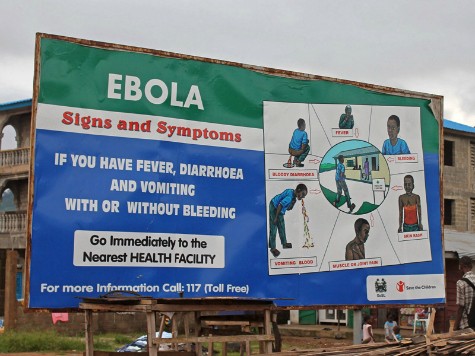As the death toll of the largest outbreak of Ebola virus in history hits 2,630, the United States Centers for Disease Control (CDC) is warning that more than half a million people could contract the virus before it is contained, according to a document set for release next week.
The document, described to Bloomberg News reporters by officials who had read it before its release, estimates that up to 550,000 people could test positive for the Ebola virus by January 2015, creating an even more unmanageable nightmare scenario in west Africa, where medical infrastructure is barely existent and already significantly threatened by the scope of this epidemic.
The 550,000 number is described as a “worst case scenario,” and Bloomberg notes that it “vastly outstrips previous estimates” by the organization. As a worst case scenario, it projects a situation where the international community does not intervene or send any aid to the affected countries: Liberia, Sierra Leone, and Guinea.
Bloomberg spoke about the matter with the World Health Organization, as well, whose spokesman, Dan Epstein, argued that it was tremendously difficult to narrow down the threat to any one potential number. “In the three weeks since then, the numbers have doubled so all three countries are still reporting cases on a steep upward curve,” he explained. “We don’t have a good idea of how big this epidemic will become.”
Worst case scenarios discussed in African media, where the situation is often denoted as an existential threat to the governments involved, make the CDC estimate look tame in comparison. In an article titled “The Fight Is Lost,” the Liberian Observer, that nation’s largest newspaper, quotes a German virologist who estimates that up to five million people could contract the virus before the outbreak is contained. Jonas Schmidt-Chanasit, of the Bernhard Nocht Institute for Tropical Medicine in Hamburg, states that the astronomical number is partly due to a lack of effort on the part of the international community to contain the outbreak early–in March or April, when the outbreak had not yet hit urban areas. “The right time to get this epidemic under control in these countries has been missed,” he is quoted as saying, noting that the virus must now “burn itself out.”
In a congressional hearing this week, Dr. Beth Bell, CDC director, refused to accept that the outbreak was a “disaster,” telling members of Congress that it would only be so “when a disaster is declared.” The CDC also declared this past week that now was the “time to prepare” to combat the Ebola virus, particularly in the United States, in the event that a traveler from west Africa brings the virus into the country.

COMMENTS
Please let us know if you're having issues with commenting.